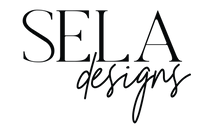Why Sela Designs Is Fighting to End Human Trafficking
The Hidden Crisis in Our Backyard: Why Sela Designs Is Fighting to End Human Trafficking
At first glance, Sela Designs might look like a beautiful jewelry and gifts brand (and we are!), but what we do goes far beyond style. We’re a non-profit social enterprise on a mission to stop human trafficking, care for orphans, and break cycles of generational poverty. Our approach is holistic, dignifying, and rooted in deep conviction that every life matters, and that your purchase has power.
Why Human Trafficking?
I started making jewelry as a hobby, something I did to raise a little extra money so I could give generously. We funded things like a vehicle for a children’s home in Ethiopia and school supplies for orphans. But as I got more involved, I started asking harder questions:
Why are so many children abandoned when their parents are still alive?
Why would a mother believe her child is better off without her?
The answer, more often than not, pointed to extreme poverty and human trafficking. What I once thought was only about orphans became a much more layered reality—where exploitation, coercion, and modern-day slavery were hiding in plain sight. And once I saw it, I couldn’t unsee it.
What Is Human Trafficking?
Human trafficking is the recruitment, transportation, harboring, or obtaining of people for sex, labor, or services through force, fraud, or coercion. It doesn’t require crossing a border. It doesn’t even require movement. It can happen in someone’s home, neighborhood, or school.
If a child is involved in commercial sex, no proof of force or coercion is needed—it is trafficking, plain and simple.
Let’s be clear: human trafficking is happening in every U.S. state—including all 72 counties in Wisconsin, our home state.
The Statistics That Keep Us Up at Night
Globally, there are an estimated 50 million people in modern slavery. More than 26.8 million are women.
In the U.S., it’s estimated that 1.1 million people are currently being trafficked—that’s about 3.3 out of every 1,000 people.
Here in Wisconsin:
-
Over 5,000 people are estimated to be trafficked in the Milwaukee metro area.
-
More than 1,300 people in the Fox Valley are currently enslaved.
-
Milwaukee is a known trafficking hub, especially along the corridor between MKE and Chicago.
-
According to Shared Hope International’s 2023 report*, Wisconsin received an “F” rating for our efforts to protect and support trafficking victims. We are one of only 21 states where children can still be prosecuted for prostitution.
*Look up your state's report card here.
Who Is Most Vulnerable?
Traffickers prey on people who are already at risk—especially:
-
Runaway or homeless youth
-
Children in foster care
-
Undocumented immigrants
-
People with disabilities
-
Individuals experiencing poverty or addiction
-
Marginalized communities
Recognizing the Signs
Sex trafficking red flags:
-
Working in a strip club, massage parlor, or illicit bar
-
Has a "manager" or controlling partner
-
Feels unable to leave a commercial sex situation
-
Is closely monitored or not allowed to speak alone
Labor trafficking red flags:
-
Owes money to employer or isn’t being paid fairly
-
Doesn’t have control over ID documents
-
Lives in isolation or in employer-provided housing
-
Faces threats of deportation or other harm
-
Works in dangerous or unsafe conditions
What Makes Sela Designs Different?
At Sela Designs, we’ve taken a multi-layered approach to combat human trafficking:
-
We employ survivors. Many of our products are made by women who have been trafficked in Southeast Asia or by an artisan group in Kenya.
-
We’re building capacity in Wisconsin to employ at-risk young women and trafficking survivors locally.
-
We fund rescue operations and aftercare, so survivors can rebuild their lives with dignity and support.
-
We are volunteer-driven. Currently, a group of 10–15 volunteers support our mission, along with a small but mighty team of consultants in marketing, photography, and operations.
-
Everything we sell is ethically sourced. From our chains and clasps to the connecting rings, we do the work to ensure every piece is made by people paid a living wage under fair labor conditions.
Your purchase doesn’t just look good—it does good.
What Can You Do?
If you’ve made it this far, you probably care deeply too. So here are some ways to take action:
1. Get Informed
Start conversations. Share facts. Help others recognize the signs of trafficking. You can even use your Sela Designs jewelry as a conversation starter—we won’t stop you from that shameless plug. 😉
2. Get Involved
Advocate for better laws and education in Wisconsin. Ask your schools, churches, and local leaders what they’re doing to protect vulnerable kids and support survivors.
3. Use Your Buying Power
Support ethical brands that prioritize transparency and fair labor. Ask where and how their products are made. Consumers have influence.
4. Support Anti-Trafficking Organizations
Whether by giving, volunteering, or shopping, your support matters. Start with:
-
Fight to End Exploitation (Milwaukee)
-
Damascus Road (Oshkosh)
-
HER Alliance (Green Bay)
Final Thoughts
Fighting human trafficking isn’t glamorous. It’s hard, heavy work. But it’s also deeply hopeful. Every time we create a job, fund a rescue, or restore dignity to a survivor—we're pushing back the darkness a little more.
At Sela Designs, we believe that business can be a force for good. And that the things we wear can tell a better story—one of justice, hope, and freedom.
Thanks for reading—and for caring.
With hope and determination,
Ashleigh
Founder of Sela Designs
